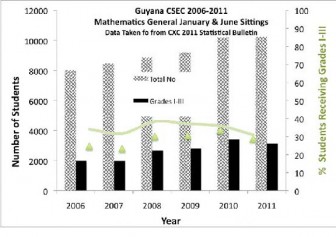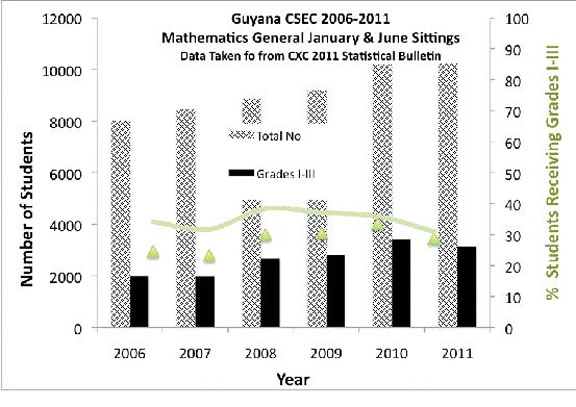By Maya Trotz
Maya Trotz grew up in Kitty, Georgetown and is an Associate Professor of Civil and Environmental Engineering at the University of South Florida. She sits on the Governing Council of the Caribbean Science Foundation and is a 2012-2013 Visiting Scientist and Program Director at the CSF. For more information, please visit http://caribbeanscience.org.
The Caribbean Examinations Council’s recent release of its Caribbean Secondary Education Certificate grades for the June 2012 sitting has stirred much discussion throughout the Caribbean region on the disappointingly low number of students receiving grades I-III in mathematics. I have just returned to the region for a year since leaving for university in 1990 and may have missed the discussions on this issue last year, the year before and the years before that, for looking at the data back to 2006 the majority of students who sat the CSEC examination have not received Grades I-III. From 2006-2011, less than 40% of students received grades 1-III in Mathematics each year, and Guyana has scored below that number at all times.
With all of the discussions in the news and on social media, one can’t help but google “CSEC mathematics syllabus” to see what it is our students should be learning (http://www.cxc.org/ SiteAssets/CCSLC%20Maths% 20syllabus%202012.pdf).
 According to the Mathematics syllabus our students should be able to do things like “read and write numbers in the decimal system, and calculate a bill given the cost of a number of items.” Of course it gets much more complicated than that, but we must recognize the lifelong tools for survival that our high school graduates are simply not mastering. More than recognition of the challenges, we must question our ethics when we tell young students that they are receiving a quality education when their inability to show mastery of topics is evident in results. We have to put our heads and skills together and commit to turning this situation around whether we are a parent, a teacher, in government, in private sector, in Guyana, or outside.
According to the Mathematics syllabus our students should be able to do things like “read and write numbers in the decimal system, and calculate a bill given the cost of a number of items.” Of course it gets much more complicated than that, but we must recognize the lifelong tools for survival that our high school graduates are simply not mastering. More than recognition of the challenges, we must question our ethics when we tell young students that they are receiving a quality education when their inability to show mastery of topics is evident in results. We have to put our heads and skills together and commit to turning this situation around whether we are a parent, a teacher, in government, in private sector, in Guyana, or outside.
As a Guyanese who lives outside of Guyana, I’d like to share my experience working with the Caribbean Science Foundation (CSF), an organization with which I am attached to for a year in Barbados as a Visiting Scientist while taking a sabbatical from the University of South Florida’s Civil and Environmental Engineering department. Launched in 2009, the CSF (caribbeanscience.org) began its first educational programme in the region this summer. We really believe in rolling up our sleeves and doing the work which we hope positively contributes to the region’s ability to better prepare a 21st century workforce that takes advantage of Science, Technology, Engineering and Mathematics (STEM).
 Examples of STEM related CSEC subjects are Agricultural Science, Biology, Building Technology, Chemistry, Geography, Information Technology, Mathematics, Physics, and Technical Drawing. The percentage of students who receive grades I-III in any of these subjects is higher than that of mathematics. For example, in Guyana in 2011 ~90% and 54.5% of students received grades I-III in Agricultural Science and chemistry respectively. The total number of students sitting subjects like Agricultural Science or Chemistry, however, pales in comparison with the total number sitting Mathematics. So, of the 10,000 plus students who are required to take Mathematics, it seems to me that less than 20% are taking STEM subjects. Our work is cut out to increase those numbers in STEM fields. For those students who are mastering these subjects we must ensure that they have the tools and motivation to further their interest in STEM careers. The Indian Science and Technology Fair currently being held in Guyana is one way to engage students and the public and demonstrate the importance of S&T and the opportunities that exist for future careers. Just as important are summer programmes that further develop student skills and demonstrate the level and type of work needed to actually pursue a science and engineering degree.
Examples of STEM related CSEC subjects are Agricultural Science, Biology, Building Technology, Chemistry, Geography, Information Technology, Mathematics, Physics, and Technical Drawing. The percentage of students who receive grades I-III in any of these subjects is higher than that of mathematics. For example, in Guyana in 2011 ~90% and 54.5% of students received grades I-III in Agricultural Science and chemistry respectively. The total number of students sitting subjects like Agricultural Science or Chemistry, however, pales in comparison with the total number sitting Mathematics. So, of the 10,000 plus students who are required to take Mathematics, it seems to me that less than 20% are taking STEM subjects. Our work is cut out to increase those numbers in STEM fields. For those students who are mastering these subjects we must ensure that they have the tools and motivation to further their interest in STEM careers. The Indian Science and Technology Fair currently being held in Guyana is one way to engage students and the public and demonstrate the importance of S&T and the opportunities that exist for future careers. Just as important are summer programmes that further develop student skills and demonstrate the level and type of work needed to actually pursue a science and engineering degree.
On August 6th, 2012, the Student Program for Innovation in Science and Engineering (SPISE) was launched at the Barbados campus of the University of the West Indies (UWI) with ten high school students from 6 different Caribbean countries (Barbados, Belize, Jamaica, St. Kitts and Nevis, St. Lucia, and Trinidad and Tobago). The students are spending four weeks in this intensive summer programme designed for those interested in pursuing careers in science or engineering.
Modeled after the well-known and highly successful MITES program at the Massachusetts Institute of Technology (web.mit.edu/mites), SPISE includes courses in calculus, physics and biochemistry. All are taught by eminent academic and industry scientists and engineers from the Caribbean and the U.S. like Professor Cardinal Warde from MIT’s Electrical Engineering Department who also holds ten key patents on spatial light modulators, displays, and optical information processing systems. I still don’t think the SPISE students realize just how special they are to have Professor Warde teach them college level calculus. Students also work in teams on projects to design, build and test systems in the areas of robotics and electronics. They learn Mandarin from a Chinese scholar visiting UWI through a programme funded by the Chinese Government, explore the “one-Caribbean” concept with Barbadian Senator Orlando Marville, consider ethics in science and engineering, and participate in Barbadian field excursions. A highlight of the 2012 SPISE is the opportunity for students to assemble and operate underwater robots, a generous gift from the Sea Grant Program of MIT. Each week they have a seminar with professionals like myself who share life experiences on becoming an engineer. During my seminar I asked the students to write down what they thought was the best thing about SPISE and received comments like, “learning new things in fun ways”, “exploring sciences through challenges and interaction”, and “my mind was opened to more details and explanations of the reasoning behind the use of calculus.”
All students participate free of charge, due to generous donations from sponsors, including Scotiabank, Williams Industries (Barbados), Light and Power Holdings, St. Lucia Electricity Services Limited (LUCELEC), MIT Sea Grant Program, the Neal & Massy Foundation, Central Bank of Barbados, Caribbean Development Bank, Belize Telemedia Limited, National Gas Company of Trinidad and Tobago Limited, BG Energy Holdings Limited, and Mr. Nicholas Braithwaite’s PETNA Foundation. The cost is approximately US$6,000 per student, and students are branded with the name of their sponsors. Students and teachers from across the Caribbean were recruited through postings on the CSF website, our email list, emails to various educational institutions and word of mouth. As a new organization in the region, we hope that soon our information will reach a larger Caribbean population and that all countries will have both student and private sector participate in SPISE. The Caribbean Examinations Council is now partnering with the CSF on this and other STEM initiatives and will provide major assistance in this regard.
According to Barbadian born Cardinal Warde, who is the Interim Director of the CSF, “Over the next 5 years, our goal is to grow the program so it serves up to 50 students annually. We anticipate that students who complete the SPISE will eventually attend some of the best science and engineering universities in the world, and become scientific, engineering and business leaders in academia and industry within the Caribbean.” Professor Warde speaks from experience as he has served as the educational director of MITES since 1997. I sit in on the SPISE staff meetings and am learning a lot from Professor Warde who I must admit I did not know when I was an undergraduate student at MIT, for I was definitely the type of student who thought professors were to be feared.
The quote that the ten 2012 SPISE students all agreed they would remember from the programme is, “well, that escalated quickly.” That really captures what the CSF plans to do in the Caribbean with respect to STEM and it’s what all Guyanese must do to guarantee our high school students are provided with an education that properly prepares them for their future.
On Friday August 31st from 1-4 pm students will demonstrate their hands-on projects at a Celebration of Knowledge hosted by the CSF and UWI at the 3W’s Oval Building at the entrance of UWI’s Cavehill Campus. This event is open to the public and will conclude with the underwater robotics project demonstration.
For more information, please visit http://caribbeanscience. org.

